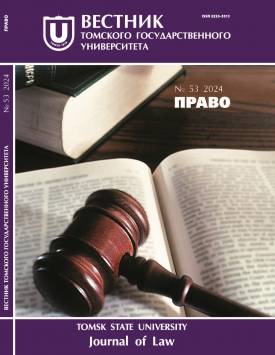Social and legal criteria for the transactional capacity of minors and their essential characteristics
Modern challenges have actualised the need for a new look at the participation of minors in transactional legal relations. The aim of the study is to propose a classification of the transactional capacity of minors according to social and legal criteria, to show the relationship of legal capacity with the degree of development of the child, to identify, along with age, other criteria of transactional capacity that determine its content. The theoretical basis of the study are the works of psychologists, legal scholars, both modern and past. The empirical basis was statistical data, specific court cases and documents of higher courts. The formal-logical method contributed to the analysis of normative material; the process of functioning and development of transactional capacity was described by means of modelling; the classification of transactional capacity by criteria revealed the essential features of each of them; new criteria of transactional capacity were constructed by the method of generalisation. In the course of the research the legal ability of a citizen to understand the meaning of his actions or to direct them was considered in the relationship with such natural abilities of a person as intellectual, volitional and physical. Traditionally, the intellectual and volitional ability to act consciously is formalised by age as the only possible quantitative measurement of a person's maturity level. The gradual maturation of a person leads to the expansion of his/her legal capacity, which is fixed by law in separate norms on the legal capacity of minors. Transactional capacity as a fundamental component of legal capacity is a dynamic category, as its content and realisation depend on many social and legal factors. In the course of the study it was substantiated that the use of age as the only legal criterion complicates the realisation of the transactional capacity of minors who have health peculiarities, in particular, when physical defects do not allow them to make a transaction. The conclusion is made about behavioural manifestations as a legal criterion based on the degree of maturity of a person. Unreasonable disposal of income; abuse of alcohol and drugs, gambling, as a result of which the property rights and interests of the family are violated; conclusion of marriage in violation of the requirements of the law all this is qualified as unlawful behaviour, which entails the application of civil law sanctions. The analysis of norms on civil capacity and family legal personality has allowed to reveal such legal criterion of transactional capacity as a special legal state of minors. In the event of emancipation and marriage, a minor acquires full civil capacity and thus full transactional capacity, except for the age limits established by law. Based on the fact that early marriages are concluded by an immature personality, it is proposed to exclude the possibility of full transactional capacity of minors married under the law of the region of the Russian Federation before the age of 16. The author declares no conflicts of interests.
Keywords
ability, development, age, health, behaviour, legal statusAuthors
| Name | Organization | |
| Voronina Svetlana V. | Altai State University | bukshina-sv@mail.ru |
References

Social and legal criteria for the transactional capacity of minors and their essential characteristics | Tomsk State University Journal of Law. 2024. № 53. DOI: 10.17223/22253513/53/9
